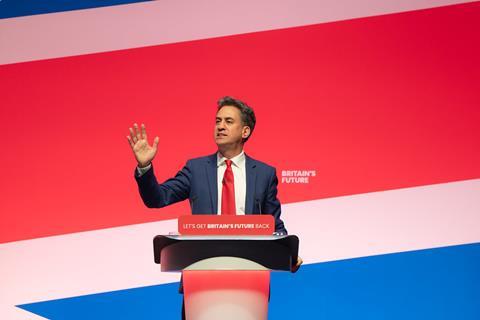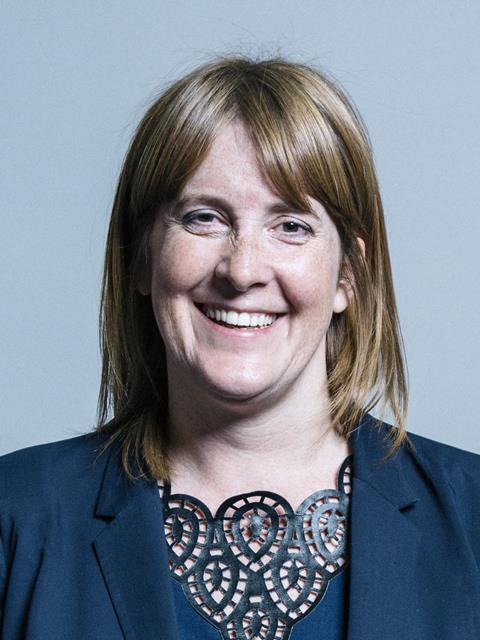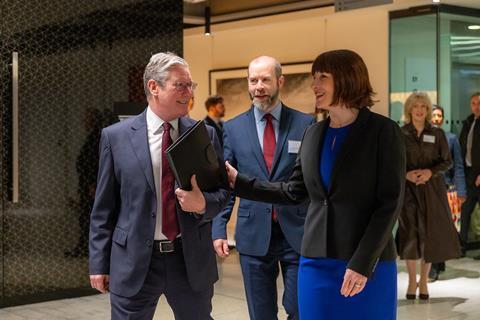With Labour riding high in the polls, Daniel Gayne looks at who will be the major players in the party if it wins the keys to Number 10

Let’s not get ahead of ourselves. A Labour victory is not yet certain. But, given the current state of the polls and the day-to-day trajectory of the Conservative party’s re-election campaign, many figures across industry are turning a keen eye towards Labour’s frontbench for a look at who they might be dealing with in Westminster come 5 July – and construction is no exception.
Early indications are of a fairly centrally coordinated approach to delivering on the party’s five missions, with a “quad” of senior figures taking the key strategic decisions. Keir Starmer, Rachel Reeves and Angela Rayner are now well-known quantities for anyone who has not been under a rock for the past half-decade, but the fourth member of this team, Pat McFadden, could also be a major influence on government policy.
A former MP and minister for business, innovation and skills, McFadden is currently Labour’s national campaign coordinator. Starmer is reportedly lining up crossbench peer Baroness Louise Casey for a senior role to work with McFadden on coordinating government delivery of the missions.
Other influential figures around the central team include Morgan McSweeney, the election campaign manager who was reportedly pivotal in the party rowing back on its £28bn green pledge, and former civil servant Sue Gray, who is leading preparations for government.
Gray is reportedly looking to introduce cross-departmental mission boards to drive progress on the government’s goals, and people involved in public affairs in the built environment say they can already see elements of this un-siloed approach.
Labour’s five missions to rebuild Britain
Kickstart economic growth to secure the highest sustained growth in the G7 – with good jobs and productivity growth in every part of the country making everyone, not just a few, better off.
Make Britain a clean energy superpower to cut bills, create jobs and deliver security with cheaper, zero-carbon electricity by 2030, accelerating to net zero.
Take back our streets by halving serious violent crime and raising confidence in the police and criminal justice system to its highest levels.
Break down barriers to opportunity by reforming our childcare and education systems, to make sure there is no class ceiling on the ambitions of young people in Britain.
Build an NHS fit for the future that is there when people need it; with fewer lives lost to the biggest killers; in a fairer Britain, where everyone lives well for longer.
One of the party’s five pledges is to make Britain a “clean energy superpower” with zero carbon electricity by 2030. According to Patrick Traynor, associate director at Copper Consultancy, a specialist communications consultancy in the infrastructure sector, this ambition could be among the most consequential for the built environment more broadly.
“[Planning reform] is crucial to what Labour are trying to achieve, especially their 2030 clean power targets,” he says. “To achieve that reform of the planning system is absolutely critical.”
Traynor says he is anticipating that an energy independence bill would be among the first pieces of legislation the party brings forward after an election win which would include some of its most significant changes to planning policy. “It’s hard to say because they could tweak existing pieces of legislation or use secondary legislation,” he says. “But I think that the energy independence act will contain a lot of interesting things from a planning point of view.”

He says that while planning is theoretically the domain of Matthew Pennycook, the shadow minister for housing, Ed Miliband’s team in the shadow department for energy security and net zero (DESNEZ) “cannot really achieve what they want to without reform”, adding that the shadow Treasury is also heavily involved in this workstream.
Darren Jones, shadow chief secretary to the Treasury, is “kind of the link between Treasury and the planning team,” according to Traynor. Jones is not yet a household name, but as an increasingly frequent media performer for the party, he soon will be.
He has also won admirers in the built environment through his involvement in the shadow Treasury team’s direct engagement with the industry, with a senior figure at one major contractor singling him out as an impressive figure.
Robert Lee, senior external affairs manager at the Construction Products Association, also identified him for praise. “Darren is talent, frankly, and I think that is why he does the morning media round so often,” he says. “He knows his brief and he is on top of the detail.
“When I talk to professionals in other spheres, they all identify Darren […] as someone to look out for. It will be interesting to see what happens after the election and how long he will stay in his brief before he gets promoted.”
Charlotte Wills, a director at Portland Communications specialising in the built environment, describes Jones as “essentially Rachel Reeves’ No 2” and says he has been relied upon to make key decisions. He was a key player in the costing of Labour’s manifesto. “He’s passionate about the future of infrastructure and what it looks like – both housing and digital,” she says.

Jones had been scheduled to deliver a keynote speech on the final day of this year’s UKREIIF conference in Leeds, but his appearance was cancelled after the election was called. Had he given it, the speech would have set out the results of Labour’s review into infrastructure delivery, overseen by Jones, which recommended combining the National Infrastructure Commission and Infrastructure and Projects Authority to create a National Infrastructure and Service Transformation Authority with new powers and an updated mandate.
More election coverage
>> General election 2024: who will get your vote?
>> Can Labour finally deliver good homes for all in beautiful, walkable places?
According to Traynor, those on the energy side of infrastructure have a good relationship with Ed Miliband, who is well known in the sector and has a “really good understanding of his brief”. Over the past few years, the Department for Levelling Up, Housing and Communities (DLUHC) has been perhaps the most influential part of government as far as the built environment has been concerned, and while its significance would no doubt continue under Labour, the party’s focus on retrofit and green energy means increasing attention will likely turn to DESNEZ.

There is a question around who the energy minister will be, with the current shadow minister, Alan Whitehead, standing down at the election. Whithead “has been their policy guru forever”, according to Louise Hutchins, head of public affairs at the UK Green Building Council, and Traynor notes that the outgoing MP for the Southampton Test constituency (which will cease to exist following the boundary changes) has been “really good in the role”.
Hutchins says her team at UKGBC are ”worried about that role being just distributed across that team and there not being a proper focus and somebody taking a lead on the built environment”, but adds that she “wouldn’t be surprised if we fairly quickly saw a Lord Whitehead” brought in as an adviser.
More generally, Hutchins says, the shadow DESNEZ team “really do need to beef up the level of expertise and experience they have got”, and, perhaps paradoxically, suggests the new intake of MPs could be a good source to draw on. She highlights three prospective parliamentary candidates – Miatta Fanhbulleh, Polly Billington and Ryan Jude – who could make useful junior ministers.
Fanhbulleh is the former chief executive of the New Economics Foundation and Hutchins notes that she is understood to have been advising Ed Miliband. ”I wouldn’t be surprised if they found a role for her,” she adds.
Billington, former chief of UK100, a network of local government leaders working on climate issues, and Jude, Westminster council’s environment lead and a programme director at the Green Finance Insititute, both have experience relevant to the decarbonisation challenge.

Within the existing team, Sarah Jones, who is shadow minister for industry and decarbonisation, could be a major influence on the retrofit agenda. Her role has her working across DESNEZ and the shadow team for the Department for Business and Trade, with Hutchins suggesting that her job might be focused on the industrial strategy elements of the retrofit challenge. According to Wills she is “well respected and known for being effective”.
Despite the focus on energy, DLUHC would still play a prominent role for the built environment under a Labour government. If the party gets a majority, Angela Rayner would also be deputy prime minister as well as secretary of state and a member of the aforementioned “quad”, which could mean more junior ministers playing more prominent roles than under the Tories.
Mike [Amesbury] is known as something of an independent thinker, but someone that they can rely upon and he has done quite a lot of work around the building safety sphere
Robert Lee, senior external affairs manager, Construction Products Association
David Parry, senior parliamentary and public affairs officer at the CIOB, drew attention to Mike Amesbury, the building safety minister, as a potentially significant player, particularly with the Grenfell report expected to be published in the government’s first months. “He was part of the building safety bill committee as it passed through parliament to become legislation,” he says.
“Given the fact that we are going to have the Grenfell report under the next government […] I think he would be a very important person within the industry. He has got good experience and background knowledge in the area and I know he has also participated in a number of conversations and round-tables on the quality of housing as a whole.”
The CPA’s Robert Lee agrees that the Grenfell report will bolster Amesbury’s profile within government. “In politics there are pipeline problems and that is one of them,” he says.
“They’ve obviously identified that as a problem and want to try and get ahead of it. Mike is known as something of an independent thinker, but someone that they can rely upon and he has done quite a lot of work around the building safety sphere.”
Matthew Pennycook, the shadow minister for housing, has been a regular presence on conference panels over the past two years and has won many admirers in the sector, although Hutchins says he has “been quite arm’s length with parts of the industry and much closer to others”. Portland’s Wills describes him as a “strong force” in the shadow DLUHC team and says that, while Rayner will “continue to set the direction for the department”, Pennycook is more “across the detail, particularly on planning” and has a strong grip of his brief.

“He will probably stay in his role as shadow housing and planning minister given the positive impact he is having on the brief unless he’s promoted,” she says.
“[He] is actually quite well respected across all the professional bodies,” says Eddie Tuttle, policy and external affairs director at the CIOB. “He is somebody that works well with all of my contacts and myself and my team in terms of housing policy, but also on that wider skills gap issue”.
Another key figure on that front could be Seema Malhotra, the shadow minister for skills in the education team, who has been in post since last year. “Given the breadth of the skills gap in construction and the built environment, there is a lot of work that is going to need to be done to ensure they are aware of the exact nature of the individuals that are needed and the exact methods that are needed to potentially train a British workforce,” says Parry.
He adds that, while the party has been “relatively quiet in terms of big broadsheet announcements”, there has been “a lot of work that has been going on behind the scenes”, pointing to the review of the apprenticeship system commissioned by the party and compiled by grandee David Blunkett last year.
“I would anticipate [the Blunkett report] forms a crucial part of their future skills policies, specifically in relationship to apprenticeships,” says Parry.
Some of the key junior ministers in Labour’s team
Matthew Pennycook
Labour’s 41-year-old shadow housing minister has been MP for Greenwich and Woolwich since 2015. He succeeded Nick Raynsford in that constituency, who had been the housing and planning minister for a number of years under Tony Blair. Pennycook has been in the housing role since 2021, previously serving as shadow brexit and shadow climate change minister.
Seema Malhotra
The MP for Feltham and Heston since 2011, Malhotra has plenty of experience as a shadow minister. She was in the shadow cabinet under Miliband and was shadow chief secretary to the treasury in Jeremy Corbyn’s first shadow cabinet, resigning a year into post to support Owen Smith’s doomed leadership bid. She has been on the front-bench since Keir Starmer’s election as leader, initially as shadow minister for employment in the work and pensions team. She was shadow minister for business and consumers from May 2021 to the 2023 shadow cabinet reshuffle, when she took her skills and further education role. Before becoming an MP, the 51-year-old was a management consultant at Accenture and PwC and special adviser to Harriet Harman during her short tenure as leader of Labour after Gordon Brown’s resignation.

Mike Amesbury
Electied in 2017 as MP for the now abolished Weaver Vale seat, Amesbury has been selected as Labour candidate for Runcorn and Helsby. A careers adviser by trade, he has also worked as a senior parliamentary to Angela Rayner and a political adviser on Andy Burnham’s campaign to become mayor of Greater Manchester. The 55-year-old was shadow minister for employment from 2018 to 2020, shadow minister for housing from 2020 to 2021 and shadow minister for local government from 2021 to 2022. After being appointed shadow minister for building safety and homelessness, he called for a “more interventionist approach from government ministers to speed up the remediation process” earlier this year.
Sarah Jones
Before becoming MP for Croydon Central in 2017, Jones served as a senior civil servant on the team responsible for delivering the 2012 London Olympic and Paralympic Games. She worked in a series of public and private sector roles after leaving the civil services, including at Gatwick airport, where she campaigned for a second runway. Previously the shadow minister for policing and the fire service, she took her decarbonisation brief, a newly created postduring the same September 2023 reshuffle as Malhotra. The 51-year-old led the Fire Safety Act 2021 through Parliament and tabled amendments to prevent fire safety remediation costs being passed on to leaseholders. The Government agreed to Jones’ amendments to implement the Grenfell Inquiry Phase 1 Recommendations by October 2021.
According to Lee, shadow immigration minister Stephen Kinnock could play a major role in shaping skills policy, with recent announcements suggesting Labour are looking to link migration policy with progress on upskilling British workers. “There is talk that he might be moved after the election and his brief is now starting to stretch more into skills and that sort of thing, and he is talking quite a lot about that,” says Lee.
Officially, construction’s representative in government sits within the Department for Business and Trade. Alan Mak, parliamentary under-secretary for industry and economic security, currently sits as co-chair of the Construction Leadership Council, but construction is just one of a long list of sectors he is responsible for. It is, perhaps, telling that the Department for Business and Trade was not mentioned much by those to whom BD spoke.
Jonathan Reynolds has given the sector a mixed impression. One senior figure at a major contractor was relatively unimpressed with the shadow business secretary after engagements with Labour’s frontbench, but the CPA’s Robert Lee says he is “one of the more organised shadow ministers” and expects him to be “quick off the mark” if Labour enter government.
“Jonathan Reynolds is an individual that’s going to be very important, going forward, and I think we’re going to see a lot of him,” he says. “I suspect, if they’re very smart about it, that it is going to be this trio of himself, Angela Rayner and the chancellor Rachel Reeves, where they will be able to complement each other’s work.”

There is uncertainty about who would be given the construction brief if Labour are elected. The CIOB’s David Parry, says: “There isn’t as an overt a position as we have currently within the current government for construction, but I would imagine it would fall under the remit of someone like Justin Madders, shadow minister for business and employment rights, or Rushanara Ali, shadow minister for investment and small businesses”.
There is, of course, always the possibility that Labour’s top team in government looks a little different to its team in opposition. But Wills notes that Starmer has “sought to bring in a strong frontbench as part of his campaign” and predicts that there will not be a cabinet reshuffle until Christmas at the earliest, though junior ministers may move around.
“Many factors will contribute to timings, but there will be a sense of giving new ministers time to make progress on the manifesto pledges they helped develop,” she says.
Jeff May, deputy chief executive of the CPA, who has responsibility for government relations, was also expecting relative calm. “We’ve heard through the grapevine that the team that the government is bringing in through the election period is the team it is largely comfortable with for the foreseeable future,” he says.
His colleague Lee says the real question will be what gets prioritised if Starmer does get the keys to Number 10. “There’s going to be a problem, and this always happens when a government changes, which is, all of a sudden they’re fighting for space on the Number 10 grid,” he explains. However, he seems reassured that the “mood music” coming from Labour is all about growth, and particularly about housebuilding.
“It looks like that is going to be front and centre,” he adds. “So there is an opportunity for our industry to get some real limelight.”
















No comments yet